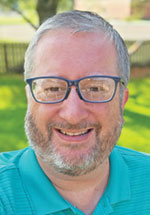Sight Unseen / Brandon A. Evans
An empty hell

Jean-Paul Sartre once famously wrote, “Hell is other people.”
And it certainly is sometimes.
We’ve all taken our turn being on the receiving end of someone else’s rudeness or jealousy or greed; their lack or empathy or even their malice. Or just their desire to be right.
And we’ve all taken our turn delivering those things.
It would be inhuman not to wonder at times how much better it would be to just live our lives without anyone else getting in the way.
But what an awful fate that would be. And what a terror to run the risk of accidentally wishing for it with our actions.
It should create in us a shiver each time we choose to put something over someone, because when we do it without regret a darkness pulls us closer, not to a hell filled with wailing souls, but to an emptiness far more despairing.
There is an episode of Star Trek: The Next Generation in which this is portrayed chillingly.
The crew of the Enterprise comes to the aid of a planet under attack by an interstellar species called the Husnock.
But their rescue is too late. They find that the entire planet has been wiped out, save one small square of perfectly manicured grass upon which sits a pristine home; inside, a kindly old man and his wife.
Eventually, the puzzle of these survivors unravels: there is no idyllic home, no loving wife. They are all illusions of a life gone past.
The man living there is an immortal being of limitless power. Having fallen in love with a human woman, he lived on the planet in peace until it was invaded. When his wife was killed along with everyone else, he reached out in a moment of rage to strike the attackers.
He admits with unspeakable shame: “I didn’t kill just one Husnock, or a hundred, or a thousand. I killed them all. All Husnock, everywhere.”
The episode ends with the man being left alone to live his pitiful eternity surrounded by the illusion of a life—and a spouse—that will never really be there.
It’s a horrifying punishment for a horrifying crime: to have everything you could ever want and no one to share it with; to have chosen exile as the cost of being rid of those whom you hate.
But genocide isn’t the only way to find ourselves on that lonely road.
Original sin beckons us to it in far more subtle ways, tempting us at all costs to give up our neighbors for something—anything—else. Sin glimmers with the promise of power and possession and exclusion, blinding us to the fact that no matter how satisfying or interesting those things are, they eventually end.
We search for the next thing but know that it will never really fill our craving.
People, though, as author Peter Kreeft once said, are the only thing in this world that never stop being interesting.
People are infinite: they are endlessly creative and endlessly unpredictable.
They are able to surprise even God, because he gave them the independence and intellect to do so. We are capable of punchlines and twist endings and worlds never seen. Heaven will never want for stories and songs and poetry, nor will it ever run out of jokes.
But no such things exist in hell: there is no room for them; only room enough for what we’ve already chosen to put there.
Those who crave war and enmity will get it but have no one to fight; the prideful will strut for crowds that will never see them; the gluttonous will dine alone on a feast that never fills.
Those who choose an eternity of their own making will be stuck in a rerun of times gone by, played over and over in the empty theater of their own mind. No new places to see, no new experiences to have. Only what was, and that forever.
Because hell is not, in the end, other people.
Hell is no one.
(Sight Unseen is an occasional column that explores God and the world. Brandon A. Evans is the online editor and graphic designer of The Criterion and a member of St. Susanna Parish in Plainfield.)†
